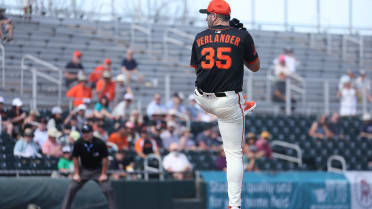Red-hot Seager smashing NLCS records
For modern hitters, there is no more noble pursuit than “grinding out an at-bat.” It is the cliché to which nearly all hitters aspire, trying to avoid chasing as they jack up an opponent’s pitch count. The Dodgers accomplished that expertly in Game 1 of the National League Championship Series, forcing Atlanta's Max Fried to throw 28 pitches in the first inning and 96 through six.
They came away without a first-inning run to show for it.
Five days later, the Dodgers changed their plan. Rather than let Fried get two strikes on them and lean heavily on his signature offspeed pitches from there, Los Angeles hitters took the fight to him early in Game 6. Corey Seager swung at the first two strikes he saw at Globe Life Field in Arlington. Justin Turner also attacked the first ball in the zone. Both homered back to back, turning their aggressive game plan into a three-run first inning during a 3-1 win over the Braves.
And so the Dodgers forced a decisive Game 7 on Sunday night, with nothing less than a pennant on the line.
“He kept us off-balance all night with that the last time we faced him,” Seager said, referring to Fried’s curveball and slider. “So we figured we’d see it early, and we’d try and attack it. Fortunately enough for us, he kind of left some balls up and we put some good swings on them. But he’s obviously a tough guy to face.”
Seager would know. In each of his first two at-bats against Fried in Game 1, he struck out -- once on a 2-2 curveball on the inner half, then on a slider in nearly the same spot. Forced to protect against Fried’s mid-90s fastball with two strikes, Seager was unable to adjust to the breaking stuff.
Rather than place himself in similar situations in Game 6, Seager attacked Fried’s breaking balls early in the count. The 0-1 curveball Fried threw him in the first inning wasn’t all that dissimilar to the curve he swung through earlier in the week. But Fried hung this one a bit more, and because it came earlier in the count, Seager was able to fight it more aggressively.
“You leave a letter-high curveball to Seager, he’s going to do what he did to it,” Fried said, bemoaning his pitch execution -- not selection -- to Seager, Turner and Cody Bellinger, who added an RBI single later in the inning. Fried did not allow another run into the seventh, but the first-inning damage -- which came over a span of his first 18 pitches -- was enough.
For Seager, that first inning was also significant on an individual level. The home run was his fifth of the series and the RBI was his 11th, both of which set NLCS records. Nelson Cruz holds the all-time marks for both categories in a single postseason series, homering six times and driving in 13 runs for the Rangers in the 2011 ALCS. Before Seager, the only NL player to hit five homers in a postseason series was Chase Utley in the '09 Fall Classic. No NL player had amassed 11 RBIs.
Seager also passed Davey Lopes and Turner for the most home runs (six) and RBIs (15) in a single Dodgers postseason, respectively, with at least one -- and potentially many more -- games still to play.
“He’s been as good in the zone this postseason, by far, that he’s ever been,” Dodgers manager Dave Roberts said.
They are heady compliments and heady numbers for Seager, who has a postseason hard-hit rate of 60 percent. Turner said simply that “Seager was Seager again,” which is about the best way to sum up the shortstop’s contributions. Roberts noted that Seager’s pitch selection has been the key to everything.
And that’s what must be most troubling for Atlanta: in upending Fried to force a decisive NLCS game, Seager and the Dodgers proved that they’re always working to learn from past mistakes.
“If we’re nitpicking, maybe we do a little bit better job of adjusting during the middle of the game,” Turner said. “But we did what we had to do to force a Game 7.”
Senior Reporter Anthony DiComo has covered the Mets for MLB.com since 2007.




